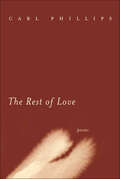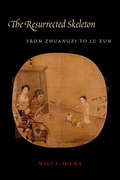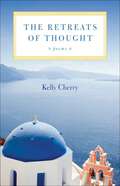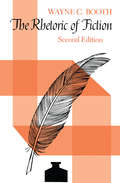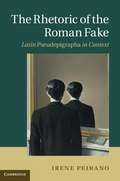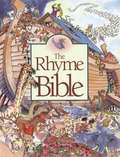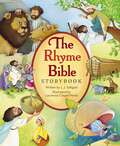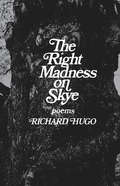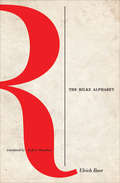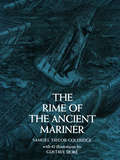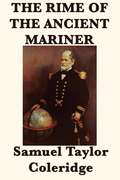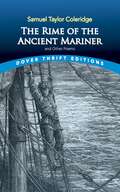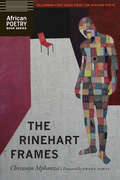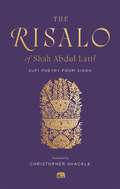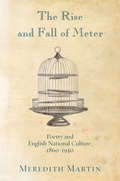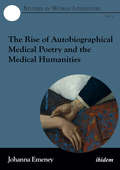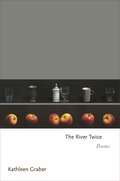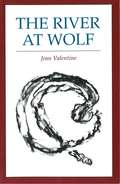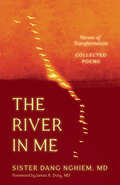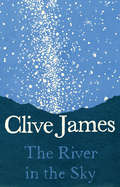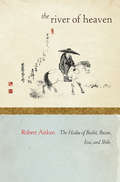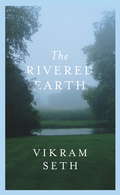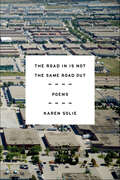- Table View
- List View
The Rest of Love: Poems
by Carl PhillipsThe light, for as far asI can see, is that of any number of late afternoons I remember still: how the lightseemed a bell; how it seemed I'd been livinginsider it, waiting - I'd heard all about that one clear note it gives. --from "Late Apollo III"In The Rest of Love, his seventh book, Carl Phillips examines the conflict between belief and disbelief, and our will to believe: Aren't we always trying, Phillips asks, to contain or to stave off facing up to, even briefly, the hard truths we're nevertheless attracted to? Phillips's signature terse line and syntax enact this constant tension between abandon and control; following his impeccable interior logic, "passionately austere" (Rita Dove, The Washington Post Book World), Phillips plumbs the myths we make and return to in the name of desire--physical, emotional, and spiritual.The Rest of Love is a 2004 National Book Award Finalist for Poetry.
The Resurrected Skeleton: From Zhuangzi to Lu Xun (Translations from the Asian Classics)
by Wilt IdemaThe early Chinese text Master Zhuang (Zhuangzi) is well known for its relativistic philosophy and colorful anecdotes. In the work, Zhuang Zhou ca. 300 B.C.E.) dreams that he is a butterfly and wonders, upon awaking, if he in fact dreamed that he was a butterfly or if the butterfly is now dreaming that it is Zhuang Zhou. The text also recounts Master Zhuang's encounter with a skull, which praises the pleasures of death over the toil of living. This anecdote became popular with Chinese poets of the second and third century C.E. and found renewed significance with the founders of Quanzhen Daoism in the twelfth century.The Quanzhen masters transformed the skull into a skeleton and treated the object as a metonym for death and a symbol of the refusal of enlightenment. Later preachers made further revisions, adding Master Zhuang's resurrection of the skeleton, a series of accusations made by the skeleton against the philosopher, and the enlightenment of the magistrate who judges their case. The legend of the skeleton was widely popular throughout the Ming dynasty (1368–1644), and the fiction writer Lu Xun (1881–1936) reimagined it in the modern era. The first book in English to trace the development of the legend and its relationship to centuries of change in Chinese philosophy and culture, The Resurrected Skeleton translates and contextualizes the story's major adaptations and draws parallels with the Muslim legend of Jesus's encounter with a skull and the European tradition of the Dance of Death. Translated works include versions of the legend in the form of popular ballads and plays, together with Lu Xun's short story of the 1930s, underlining the continuity between traditional and modern Chinese culture.
The Retreats of Thought: Poems (Voices of the South)
by Kelly CherryKelly Cherry, who studied philosophy in graduate school at the University of Virginia, has never lost her deep love of the subject; The Retreats of Thought takes the reader through the philosophical domain. What do we really know of our world? Why is there anything at all? What is time? What is a person? What is mind? What are goodness and beauty? What does the artist seek? These and other problems are shrewdly examined in Cherry’s passionate, skeptical, witty, and sometimes wry poems. Cherry places herself in the pragmatic tradition of philosopher Charles Sanders Peirce but admits to Platonic longings.
The Revised English Hymnal Words Edition
by English Hymnal Company LtdThis is the words-only edition of the 2023 hymnal used in the Anglican Communion in the United Kingdom. It contains the hymns, some service material and appendices designed to assist in choosing appropriate hymns for each Sunday and festivals. There's also an index of first lines and tunes. As with other hymnbooks on Bookshare, this too has DAISY markups. Days of the church year are at level 1 and individual hymns are at level 2. In a BRF file, Bookshare software creates a lengthy table of contents followed by the text of the hymn book. For other hymn collections on Bookshare see also: Hymns of Light and Love; Hymns for Christian Service and Worship; Hymns of Faith; Redemption Hymns; Christian Hymns; The New Believers Hymn Book; Gospel Hymn Book; The United Methodist Hymnal; Glory to God (Presbyterian); Evangelical Lutheran Worship (ELCA); and Lutheran Servicebook: Psalms and Hymns (Missouri Synod). For texts of cantatas by Johann Sebastian Bach, see The Church Cantatas of J. S. Bach by Alec Robinson (with commentary), and Johann Sebastian Bach: The Complete Cantatas in German-English translations by Richard Stokes.
The Rhetoric of Fiction
by Wayne C. BoothThe first edition of The Rhetoric of Fiction transformed the criticism of fiction and soon became a classic in the field. One of the most widely used texts in fiction courses, it is a standard reference point in advanced discussions of how fictional form works, how authors make novels accessible, and how readers recreate texts, and its concepts and terms—such as "the implied author," "the postulated reader," and "the unreliable narrator"—have become part of the standard critical lexicon. For this new edition, Wayne C. Booth has written an extensive Afterword in which he clarifies misunderstandings, corrects what he now views as errors, and sets forth his own recent thinking about the rhetoric of fiction. The other new feature is a Supplementary Bibliography, prepared by James Phelan in consultation with the author, which lists the important critical works of the past twenty years—two decades that Booth describes as "the richest in the history of the subject."
The Rhetoric of the Roman Fake
by Irene PeiranoPrevious scholarship on classical pseudepigrapha has generally aimed at proving issues of attribution and dating of individual works, with little or no attention paid to the texts as literary artefacts. Instead, this book looks at Latin fakes as sophisticated products of a literary culture in which collaborative practices of supplementation, recasting and role-play were the absolute cornerstones of rhetorical education and literary practice. Texts such as the Catalepton, the Consolatio ad Liviam and the Panegyricus Messallae thus illuminate the strategies whereby Imperial audiences received and interrogated canonical texts and are here explored as key moments in the Imperial reception of Augustan authors such as Virgil, Ovid and Tibullus. The study of the rhetoric of these creative supplements irreverently mingling truth and fiction reveals much not only about the neighbouring concepts of fiction, authenticity and reality, but also about the tacit assumptions by which the latter are employed in literary criticism.
The Rhyme Bible Storybook
by ZondervanThe Rhyme Bible Storybook brings classic Bible stories from the Old and New Testaments to life, retold in rhyme so that children are enthusiastic to read along, excited to read aloud, and, most importantly, eager to remember their favorite Scripture verses.Storybook Bibles are wonderful ways for young children to begin their journey into knowing and loving God&’s Word. The Rhyme Bible Storybook:Is ideal for children ages 4-8Features eye-catching art throughoutIncludes classic Bible stories from the Old and New Testaments told in read-aloud rhymeIs a popular a gift from parents and grandparents for birthdays, Christmas, Easter, and First CommunionsThe Rhyme Storybook Bible provides a unique and appealing way for children to hear God&’s truths, with its rhyming text and vibrant illustrations.
The Right Madness on Skye: Poems
by Richard HugoIn an essay on Richard Hugo, the poet James Wright called him "one of the precious few poets of our age . . . who has, and sustains, an abiding vision." Hugo took that vision to Skye with him: he makes Scottish history, legends, and "triggering towns" his own in these new poems, just as he has earlier done in poems of the American West. And in making them his own, he makes them our own as well. He continues to be, in Wright's words, "a great poet, true to our difficult life." In September of 1977 Richard Hugo and his family went to live for several months on the Isle of Skye, off the coast of Scotland. One of the results of that experience is this new and impressive volume of poems.
The Rilke Alphabet
by Ulrich BaerThe renowned Rilke scholar brings the poet&’s work to life for modern readers through 26 essays, each devoted to a single word found in his writings. Ulrich Baer&’s The Rilke Alphabet explores the enduring power of one of the world&’s greatest poets, a visionary who saw that even the smallest overlooked word could unlock life&’s mysteries. With deep insight and love for Rilke&’s language, Baer examines twenty-six words that are not merely unexpected in his work, but problematic—even scandalous. Through twenty-six evocative essays, Baer sheds new light on Rilke&’s creative process and his deepest thoughts about life, art, politics, sexuality, love, and death. The Rilke Alphabet shows how the poet&’s work can be a guide to life even in our contemporary world. Whether it is a love letter to frogs, a troubling—though brief—infatuation with Mussolini, a sustained reflection on the Buddha, or the impassioned assertion that freedom must be lived in order to be known, Rilke&’s thoroughly original writings pull us deeply into life. Baer&’s decades-long experience as a scholar, translator, and editor of Rilke&’s writings allows him to reveal unique aspects of Rilke&’s work. The Rilke Alphabet will surprise and delight Rilke fans, and deepen every reader&’s sense of the power of poetry to penetrate the mysteries of our world.
The Rime of the Ancient Mariner
by Gustave Doré S. T. ColeridgeGustave Dore's magnificent engravings for The Rime of the Ancient Mariner are among the later works of the great French illustrator. The intensely evocative poem provided Doré with the long-awaited opportunity to convey limitless space on a gigantic scale, and he exploited the poem's fantastic range of atmosphere to the limits of its possibilities. The terrifying space of the open sea, the storms and whirlpools of an unknown ocean, the vast icy caverns of Antarctica, the hot equatorial sea swarming with monsters, all of the amazing visual elements that make Coleridge's masterpiece one of the most exciting and most memorable poems in the English language are unforgettably engraved in Doré's plates.This edition reproduces all of the plates to perfection, in their original size. The illustrations and the text of the poem appear on facing pages, so that the imaginative kinship of Doré and Coleridge is delightfully evident on every page: the illustrations capture all the moods of the poem in their full intensity, bringing the images evoked by the words into clear visual focus. Unabridged and slightly rearranged republication of the 1878 American edition. Text slightly amended to conform to the authoritative 1834 edition of the poem.
The Rime of the Ancient Mariner
by Samuel Taylor ColeridgeThe Rime Of The Ancient Mariner is a hauntingly beautiful work, acclaimed both for the lyrical quality of its language and for the ghostly atmosphere it evokes. Samuel Taylor Coleridge's masterpiece related the tale of a sailor who shoots a lucky albatross and is condemned to wander the sea in search of redemption, burdened with guilt over his deed and the resulting deaths of his shipmates.
The Rime of the Ancient Mariner (Dover Thrift Editions: Poetry Ser.)
by Samuel Taylor ColeridgeGreat title poem plus "Kubla Khan," "Christabel," 20 other sonnets, lyrics, odes: "Frost at Midnight," "The Nightingale," "The Pains of Sleep," "To William Wordsworth," "Youth and Age," more. All reprinted from authoritative edition.
The Rinehart Frames (African Poetry Book)
by Cheswayo MphanzaThe poems in The Rinehart Frames seek to exhaust the labyrinths of ekphrasis. By juxtaposing the character of Rinehart from Ralph Ellison&’s Invisible Man with the film 24 Frames by Abbas Kiarostami, the poems leap into secondary histories, spaces, and languages that encompass a collective yet varied consciousness of being. Cheswayo Mphanza&’s collection questions the boundaries of diaspora and narrative through a tethering of voices and forms that infringe on monolithic categorizations of Blackness and what can be intersected with it. The poems continue the conversations of the infinite possibilities of the imagination to dabble in, with, and out of history.
The Risalo of Shah Abdul Latif: Sufi Poetry from Sindh (Murty Classical Library of India)
by Shah Abdul LatifA landmark English translation of Sindhi literature’s most famous classic.Shah Abdul Latif’s Risalo, loosely translated as “the message,” is widely regarded as the pinnacle of Sindhi literature, cherished across South Asia and the diaspora. This collection of Sufi verses, originally crafted for musical performance in the eighteenth century, weaves a rich tapestry of mystical and divine love, drawing on both Islamic tradition and local Sindhi culture. Latif’s poetry also immortalizes timeless love stories, such as those of Sasui Punhun, Suhini Mehar (Sohni Mahiwal), and Lila Chanesar, which continue to captivate millions.Latif (1689–1752) is a revered Sufi saint whose shrine is a beloved pilgrimage site in present-day Pakistan. His Risalo reflects a deep commitment to bringing together Islamic as well as Hindu devotional and ascetic traditions, and includes verses celebrating the spirituality of yogis.This first authoritative translation into modern English introduces a new generation to one of the greatest treasures of Indo-Islamic literature.
The Rise and Fall of Meter: Poetry and English National Culture, 1860--1930
by Meredith MartinWhy do we often teach English poetic meter by the Greek terms iamb and trochee? How is our understanding of English meter influenced by the history of England's sense of itself in the nineteenth century? Not an old-fashioned approach to poetry, but a dynamic, contested, and inherently nontraditional field, "English meter" concerned issues of personal and national identity, class, education, patriotism, militarism, and the development of English literature as a discipline. The Rise and Fall of Meter tells the unknown story of English meter from the late eighteenth century until just after World War I. Uncovering a vast and unexplored archive in the history of poetics, Meredith Martin shows that the history of prosody is tied to the ways Victorian England argued about its national identity. Gerard Manley Hopkins, Coventry Patmore, and Robert Bridges used meter to negotiate their relationship to England and the English language; George Saintsbury, Matthew Arnold, and Henry Newbolt worried about the rise of one metrical model among multiple competitors. The pressure to conform to a stable model, however, produced reactionary misunderstandings of English meter and the culture it stood for. This unstable relationship to poetic form influenced the prose and poems of Robert Graves, Siegfried Sassoon, Wilfred Owen, W. B. Yeats, Ezra Pound, and Alice Meynell. A significant intervention in literary history, this book argues that our contemporary understanding of the rise of modernist poetic form was crucially bound to narratives of English national culture.
The Rise of Autobiographical Medical Poetry and the Medical Humanities (Studies in World Literature #5)
by Johanna EmeneyIn this fascinating book, Johanna Emeney examines the global proliferation of new poetry related to illness and medical treatment from the perspective of doctors, patients, and carers in light of the growing popularity of the medical humanities. She provides a close analysis of poetry from New Zealand, the U.S., and the U.K. that deals with sociological and philosophical aspects of sickness, ailment, medical treatment, care, and recuperation.
The River Twice: Poems (Princeton Series of Contemporary Poets #146)
by Kathleen GraberAn impressive new collection from a poet whose previous book was a finalist for both the National Book Award and the National Book Critics Circle AwardTaking its title from Heraclitus's most famous fragment, The River Twice is an elegiac meditation on impermanence and change. The world presented in these poems is a fluid one in which so much—including space and time, the subterranean realm of dreams, and language itself—seems protean, as the speaker's previously familiar understanding of the self and the larger systems around it gives way. Kathleen Graber’s poems wander widely, from the epistolary to the essayistic, shuffling the remarkable and unremarkable flotsam of contemporary life. One thought, one memory, one bit of news flows into the next. Yet, in a century devoted to exponentially increasing speed, The River Twice unfolds at the slow pace of a river bend. While the warm light of ideas and things flashes upon the surface, that which endures remains elusive—something glimpsed only for an instant before it is gone.
The River at Wolf
by Jean Valentine"Jean Valentine has written a visionary book. If it is built with the brick and wood of this world, the light that pours through its windows is searing, healing."--Marie Howe
The River in Me: Verses of Transformation
by Sister Dang NghiemFind refuge and wisdom with a student of Thich Nhat Hanh in the pages of this poignant poetry collection that speaks to the heart of overcoming life&’s adversities, Zen styleThis profound poetry collection, written by a disciple of Zen Master Thich Nhat Hanh, charts a journey from turmoil to tranquility. In this deeply personal work, Sister Dang Nghiem, known for her insightful and compassionate teachings, unveils a journey of transformation and healing that bridges two pivotal phases of her life: the years prior to her monastic ordination and the profound insights gained thereafter. This unique compilation, divided into two distinct parts, illustrates Sister Dang Nghiem's evolution not just as a poet but as a spiritual practitioner. The first half, spanning 1989-1999, offers a glimpse into her pre-monastic life, filled with yearnings for reconciliation and liberation yet entangled in suffering and attachments. The latter half, encompassing her writings from 2000 to 2023, reflects a stark transformation, imbued with the wisdom and tranquility of her Zen practice. Not just a display of poetic prowess, but also a testament to Sister Dang Nghiem's resilience and spiritual growth, these poems resonate with honesty and vulnerability, providing readers with a candid testament to the life-altering power of healing through mindfulness and deep community. The River in Me offers a path toward inner peace and wholeness for those navigating the complexities of life and is an essential read for anyone seeking solace and understanding.Includes 17 black and white photographs prior to and after monastic ordination.
The River in the Sky: A Poem
by Clive JamesIn this deracinated age appears a miraculous epic that pays homage to Dante and Camus. “Few people read Poetry any more, but I still wish to write its seedlings down, if only for the lull of gathering: no less a harvest season for being the last time,” writes Clive James in his epic poem, The River in the Sky. What emerges from this lamentation is a soaring epic of exceptional depth and overwhelming feeling, all the more extraordinary given its appearance in an age when the heroic poem seems to have disappeared from contemporary literature. Among James’s many talents is his uncanny ability to juxtapose references to early twentieth-century poets with “offbeat humor and flyaway cultural observations” (Dwight Garner, New York Times), or allusions to the adagio of Beethoven’s Ninth Symphony contrasted with references to “YouTube’s vast cosmopolis.” Whether recalling his Australian childhood or his father’s “clean white headstone” in a Hong Kong cemetery, James’s autobiographical epic ultimately helps us define the meaning of life.
The River of Heaven: The Haiku of Basho, Buson, Issa, and Shiki
by Robert AitkenKnown to many as the study of quiet stillness and introspection, Zen Buddhism distinguishes itself through brilliant flashes of insight and its terseness of expression. In River of Heaven these concepts and pillars lend themselves to an exploration of Haiku, one of the most delicate and interpretive poetic forms in the world. The haiku verse form, with its rigid structure and organic description is a superb means of studying Zen modes of thought because its seventeen syllables impose a limitation that confines the poet to vital experience. In Haiku as in Buddhism, the silences are as expressive as the words.In this volume, American Senior Zen Roshi Robert Aitken gives new insight into Haiku by poetic masters Basho, Issa, Buson, and Shiki. In presenting themes from Haiku and from Zen literature, Aitken illuminates the relationship between the two. Readers are certain to find this an invaluable and enjoyable experience for the remarkable revelation it offers.
The Rivered Earth: From the author of A SUITABLE BOY
by Vikram SethThe Rivered Earth contains four libretti written by Vikram Seth to be set to music by Alec Roth - together with an account of the pleasures and pains of working with a composer.Entitled 'Songs in Time of War', 'Shared Ground', 'The Traveller' and 'Seven Elements', they take us all over the world - from Chinese and Indian poetry to the beauty and quietness of the Salisbury house where the poet George Herbert lived and died.Spanning centuries of creativity and humanity, these poems pulse with life, energy and inspired brilliance.They are accompanied by four pieces of calligraphy by the author.
The Road In Is Not the Same Road Out: Poems
by Karen SolieA profound new collection from one of poetry's rising stars"Introducing Karen Solie, I would adapt what Joseph Brodsky said some thirty years ago of the great Les Murray: ‘ . . . He is, quite simply, the one by whom the language lives.' . . . And, yes, as we embark on the third millennium of our so-called Common Era, she is indeed the one by whom the language lives." —Michael Hofmann, London Review of BooksA sublime singer of existential bewilderment, Karen Solie is one of contemporary poetry's most direct and haunting voices. A poet of the in-between places—the purgatory of wayside motels and junkyards, the abandoned Calgary ski jump and the eternal noon of Walmart—her poems stake out startlingly new territory and are songs for our emerging world, an age of uncertainty and melting icebergs. In Solie's new collection, The Road In Is Not the Same Road Out, she restlessly excavates our civilization, the moments of tough luck, casual violence, naked desire, and inchoate menace, pursuing "Beauty and terror / in equal measure" and fixing on the "Intrigue of a boarded-up building. / We want to get in there and find out what's the matter with it." Amplifying the elegant recklessness of her Griffin Poetry Prize–winning collection Pigeon, these poems bear an uncanny poetic intelligence and unflinching vision.
